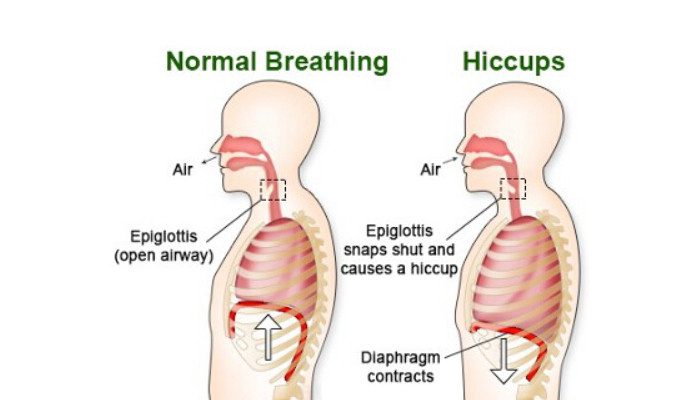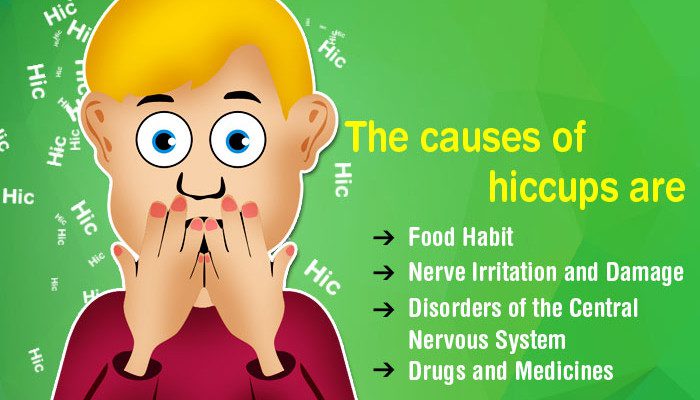Hiccups are an unexpectedly common symptom seen in patients having cancer, whether during cancer treatment or in the palliative care setting. Hiiccups causes these sounds due by involuntary clonic spasms of the diaphragm and intercostal muscles due to sudden closure of the glottis. In most cases, they are annoying and usually stop within a few minutes. However, some patients may experience continuing periods of greater than 24-48 hours, these are persistent/chronic/intractable hiccups that last more than 2 months, and up to 10% of the patients having advanced cancer deal with it. These are more common in men compared to women.
Effects of prolonged hiccups on the patient having cancer
Prolonged or persistent may have undesirable effects. These may include:
- fatigue/tiredness
- Reduction in fluid and food intake
- Emotional anxiety and distress
- Lack of sleep
- Irritation
- Deduction in cognitive function
- Problems in aspiration
- Weight loss
- Diminish the quality of life
- For a mesothelioma patient, hiccups can be painful.
Plausible causes of persistent hiccups
- Many conditions are thought to be the cause of this problem including low levels of calcium, sodium, and potassium, alcohol intake, sudden strokes, head injuries, and many more but the exact cause is still not verified.
- Many doctors say that this can also be due to the intake of medications as many of them are used in the treatment and also during chemotherapy. Of these medications.
- It is said that the most frequent cause of prolonged/experienced hiccups is dexamethasone.
- Definite chemotherapy drugs used during the treatment – In people with cancer sometimes, these drugs might cause side effects.
- Changes in temperature
- Other drugs, including anti-nausea medicines, steroids, and antibiotics.
- Nerve and minor brain injuries.
- If your kidneys are not functioning properly
- The cancer is pressuring your diaphragm
Treatments for mild hiccups
There are no medical treatments for treating hiccups as these are temporary and get away easily without treatment. Many old and home remedies for hiccups are said to be efficient but may not work on the patient having persistent hiccups, these remedies include:
- Holding the breath
- Gargling
- Acupuncture
- Rubbing the pharynx with cotton
- Breathing into a paper bag
- Biting a lemon
- Digital rectal massage
- Taking a deep breath and holding it for a few second and then reeling it slowly may also help
Treatments for persistent hiccups
Other treatments include Chlorpromazine, Chlorpromazine is a dimethylamine derivative of phenothiazine. It acts peripherally by dopamine antagonism in the hypothalamus. It is the only medication approved for the treatment of hiccups by the US Food and Drug Administration, and for many years it has been in use.
Unfortunately, it doesn’t apply to everyone and has adverse reactions like confusion, hypotension, tiredness, nausea, urinary retention, and excessive sleep even in a single dose.
Baclofen is also an effective drug for people suffering from persistent hiccups and has initiation of baclofen resulted in the proper resolution of hiccups in 6 out of 10 patients and showed remarkable improvement in 2 patients. It is suggested to take an amount of 5gm-20gm of baclofen, three times a day.
Gabapentin is also a medication that has shown significant improvement and the hiccups were relieved by oral gabapentin. Baclofen is a gamma-aminobutyric acid (GABA) analog that activates an inhibitory neurotransmitter is thought to help in blocking the hiccup stimulus. It is recommended to take 100 mg of gabapentin three to four times a day.
Nifedipine, a calcium channel blocker, may play a role in reversing the abnormal depolarization in the hiccup reflex arc.1 It has been reported to put an end to persistent hiccups but tends to induce hypotension, which may be especially severe in volume contracted patients or those receiving opioids. A daily dose of 30 to 60 mg of this drug had a significant effect on patients’ hiccups and even stopped the hiccups in 24 hours.
FAQS on Hiccups in Cancer Patients?
What helps hiccups in cancer patients?
Your doctors would be the best expert to help treat the hiccups directly based on your condition. The most common medication for treating hiccups in cancer patients would be the anti-sickness drug metoclopramide (Maxolon) or a sedative such as haloperidol or chlorpromazine.
What causes hiccups in cancer patients?
Hiccups occur mostly due to irritation of the nerve that controls the diaphragm which can have different reasons behind it. Those might be due to a certain chemotherapy drug used for treating cancer. Other medications that can or cannot be used for cancer-related problems, such as steroids, antibiotics, or anti-nausea medicines.
Which medicine is best for hiccups?
Medications that are effective in treating long-term hiccups are the following:
- Baclofen
- Metoclopramide
- Chlorpromazine
Can hiccups be a side effect of chemo?
Hiccups are one of the side effects of chemotherapy. Intractable hiccups severely affect a person’s resting and eating habits while reducing their quality of life.
What to take to stop hiccups?
Here are some effective tips for curing hiccups-
- Drink water very quickly
- Tell someone beforehand to frighten you
- Gargle with water
- Bite on a lemon
- Pull hard on your tongue
- Use smelling salts
What drug causes hiccups?
Here are some of the most common drugs that set our triggering hiccups:
- Barbiturates (methohexital)
- Antibiotics (azithromycin)
- Phenothiazines (perphenazine)
- Opioids (hydrocodone) Alcohol
- Benzodiazepines – midazolam, lormetazepam, and lorazepam
- Steroids – dexamethasone, methylprednisolone, oxandrolone, and progesterone
Can hiccups be a sign of something serious?
Yes, hiccups can be a sign of serious illness. Make an immediate appointment to see the doctor if your hiccups last more than 48 hours or if the hiccups turn so bothering that they can cause problems with eating, sleeping, or breathing.
Are hiccups a sign of death?
Hiccups can happen if a person nears death if they have an underlying health condition or taking a specific medication. Hiccups are a major complication of severe illness due to the effects of treatment medication.
Why does Sugar stop hiccups?
Sugar is a distraction technique that’s effective in treating hiccups, mostly mild ones. Take a spoonful of sugar and let it dissolve on your tongue or tickle the roof of your mouth with a Q-tip or stick your finger in your ears to stimulate branches of the vagus nerve. The overload on other vagus endings will get rid of hiccups.
Do hiccups go away when you sleep?
Yes! The hiccups have a significant tendency to fade away at sleep onset.
Book an appointment with the Best Cancer Specialist at Oncoplus Hospital.

